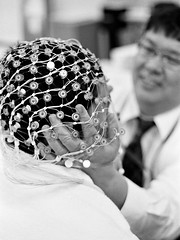Ever hear about "the singularity"? It's the vague idea that technological advancement and machine intelligence is exponential, and will completely overwhelm humanity. One part of that is the sci-fi idea that we'll be able to analyse and copy the exact brain pattern of an individual, then have them live on as potentially immortal simulations, perhaps with robotic bodies to interact with the real world. Standard science fiction fare, but some people believe this is a real possibility.
In this piece, David Linden argues that while it is conceptually possible to actually copy somebody's mind, the proponents are very wrong on just how difficult it is, and how much time it will take before we'd be able to actually do this.
As a computational neuroscientist (well, sort of at least), I agree with pretty much every word he says. We are a product of our brains, situated in the world, and if you were able to do a faithful functional copy of the mind and of the world you'd be able to live on. No ghost in the machine is necessary. However, we are very, very far from being able to do anything like this. Never mind knowing enough about the brain to do a faithful functional copy; we don't even know enough of its function to understand what we'd need to know in order to do this.
In this piece, David Linden argues that while it is conceptually possible to actually copy somebody's mind, the proponents are very wrong on just how difficult it is, and how much time it will take before we'd be able to actually do this.
As a computational neuroscientist (well, sort of at least), I agree with pretty much every word he says. We are a product of our brains, situated in the world, and if you were able to do a faithful functional copy of the mind and of the world you'd be able to live on. No ghost in the machine is necessary. However, we are very, very far from being able to do anything like this. Never mind knowing enough about the brain to do a faithful functional copy; we don't even know enough of its function to understand what we'd need to know in order to do this.
There are people bandying about a time frame of 10-20 years for this kind of thing; a more realistic estimate would be anything between ten and fifty times that number. I certainly don't expect to see a successful experimental result within my lifetime.


Read the whole thing and your imput. Impressive, never thoguht that the brain was design in such a way with no real space between them...I guess Kurzweil overlocked that part as well.
ReplyDeleteWe still have way to go...I would have wanted to see some type of nanobots before my demise, but oh well...we are just a small spot in a big painting.
I'm most worried that we will treat stupid computer systems as if they are more intelligent than we are.
ReplyDeleteSimon: but what if the computer systems actually were more intelligent than us?
ReplyDeleteAs I wrote, I find nothing theoretically or technically impossible about real machine consciousness or intelligence (two separate concepts). If we can avoid destroying our own societies for long enough I do believe we will be able to create machines that are our peers or possibly beyond in both respects.
To what degree there is any point in doing so is another issue altogether. It's unlikely a conscious computer is going to be a good replacement for a human in all but the most specialized circumstances for instance.